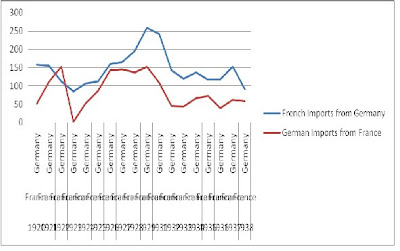There are some historians who state that trade has no effect on whether two nations go to war with one another. An example that is often cited is the fact that the United States, prior to World War II, was Japan's biggest trading partner. (Gaddis) From 1920 – 1938, the United States and Japan were one of the worlds leading trading partners (see table 1). For those years, American imports from Japan ranged from 2nd – 9th highest and Japanese imports from America ranged from 3rd – 10th highest in the world between two countries (see figure 1) (Barbieri, 2008).
Then beginning in 1937, Japan and China officially began a full scale war – with the battle of Marco Polo Bridge near Beijing. With this, United States sentiment began to shift away from Japan and towards China and by 1940 the United States government slowly began to tighten restrictions on Japan. At that time, the United States was the main supplier of the oil, steel, iron, and other commodities needed by the Japanese military. When Japan made it clear that they were intending to become involved militarily in Southeast Asia, where the United States had more strategic interests, the United States responded to this growing threat by instituting a full embargo on exports to Japan, freezing Japanese assets in U.S. banks, and sending supplies into China. Faced with serious shortages as a result of the embargo, unable to retreat, and convinced that the U.S. officials opposed further negotiations, Japan's leaders came to the conclusion that they had to act swiftly. Japanese planes bombed the U.S. fleet at Pearl Harbor on December 7, 1941 (US Department of State).
The fact was that during the 1920's and 30's, the United States was Japan's main - and strategic - trading partner. But when Japan started an offensive war in China, the United States sanctioned, and eventually embargoed, trade with Japan. By the time Pearl Harbor was bombed, trade was nearly non-existent between the two countries.
The next example is of French and German trade relations from 1920 – 1938 (see figure 2). These dates will be separated from 1920 – 1932 and 1933 – 1938. The first sample is French-German trade before Hitler's rise to power. During this time period, Germany and France were both trading with each other at a positive, growing rate. After Hitler's rise to power – in which he preached a strongly nationalistic agenda which became very populist on account of the financial fallout of 1929, in July 1932, trade dropped off between the two nations into amounts seen only in 1923 (see table 2), and maintained very low levels through 1938. By the fall of 1939, Germany and France were at war with one another.
The results of a financial fallout can be, and has been historically, blamed for the primary reason behind the radicalization of politics in Europe. As William Manchester wrote:
No one who has gazed on such a scene could doubt that this financial disaster, huge as it is, cruel as it is to thousands, is only a passing episode in the march of a valiant and serviceable people who by fierce experiment are hewing new paths for man, and showing to all nations much that they should attempt and much that they should avoid"…"Economical Blizzard," as he [Winston Churchill] came to call it, was responsible for turning all England into "one vast soup kitchen," driving the country back off the gold standard, doubling the number of British unemployed, and radicalizing politics throughout Europe, especially Germany (Manchester).
Some will argue that it is in the best national security interest to keep as much industry – whether manufacturing or high tech – in the United States. Their argument is that if we export out all of our industry, we are boring a hole in our economy by having fewer middle class jobs, thus raising the standard of living abroad while lowering our standard of living. Not only that, but if we export out all of our manufacturing capabilities overseas, if we are faced with an international threat – such as we faced in W.W. II – we might not be able to respond in the scale and decisiveness as we did during past crises'.
The record of the past six decades says different though. With the standard of living increasing dramatically in countries that have embraced Liberalism, the motivations and costs to go to war seem to have increased to a level where major power conflict may be a thing of the past.
The risk to this stability though is when protectionism is enacted, production is brought back home and trade is lowered. When jobs are lost, stability is compromised (ex. Germany 1929, Russia 1913, Venezuela, Spain)
As will be discussed later, globalization needs stability in international markets in order to thrive. If this stability is lowered, economies will be affected by protectionist measures and the risk of political radicalization is increased. Additionally, if tariffs or embargos are enacted in response to protectionist measures, markets are lost which means the demand for items shrinks. Less demand causes the industry to shrink. Industry shrinkage leads to job cuts. Job cuts can lead to instability. Far from being a national security risk is globalization.
Conversely, if international trade is promoted, other countries standards rise. As their wages increase and the competitive advantage to use them as cheap labor decreases, their economy will stabilize and mature. With this evolution and raised wages, disposable income increases. As disposable income increases, demand for products will increase which creates new markets. With new markets, there is an opportunity for growth which leads to jobs being created.
As an example, if I saw that the demand for golf balls in China was more than the supply, I could create a small factory and hire 4 people to make golf balls. I could sell the golf balls just to the Chinese market and in so doing this, 5 jobs would be created. If it were not for international trade, this market would not be open and 5 people would not have jobs.
America is not just an outsourcing country either. Manufacturing from other countries has increased in recent years as the dollar devalues relative to the Euro and Pound. Airbus has built factories in Wichita, Kansas and Mobile, Alabama, for parts for their airplanes. BMW has built a car manufacturing plant in South Carolina. Toyota has a manufacturing plant in Hebron, Kentucky and Honda has also sent manufacturing factories to Indiana, Ohio and Alabama in recent years.
Figure 1



Table 1
Year | Importer 1 | Importer 2 | US Imports from Japan (in millions) | Japanese Imports from US (in millions) |
1920 | USA | Japan | 414.57 | 439.89 |
1921 | USA | Japan | 251.26 | 277.08 |
1922 | USA | Japan | 354.29 | 284.97 |
1923 | USA | Japan | 346.94 | 248.77 |
1924 | USA | Japan | 340.06 | 253 |
1925 | USA | Japan | 386.86 | 255.72 |
1926 | USA | Japan | 405.64 | 320.5 |
1927 | USA | Japan | 402.1 | 328.83 |
1928 | USA | Japan | 384.34 | 293.36 |
1929 | USA | Japan | 432 | 301.54 |
1931 | USA | Japan | 206 | 168.94 |
1932 | USA | Japan | 134 | 143.37 |
1933 | USA | Japan | 128 | 159.27 |
1934 | USA | Japan | 119 | 228.52 |
1935 | USA | Japan | 153 | 240 |
1936 | USA | Japan | 172 | 245.79 |
1937 | USA | Japan | 204 | 365.67 |
1938 | USA | Japan | 127 | 267 |
Figure 2

Table 2
Year | Importer 1 | Importer 2 | French Imports from Germany (in millions) | German Imports from France (in millions) |
1920 | France | Germany | 158.1 | 50.99 |
1921 | France | Germany | 155.05 | 111.3 |
1922 | France | Germany | 112.21 | 152.85 |
1923 | France | Germany | 84.46 | 1.66 |
1924 | France | Germany | 105.38 | 51.82 |
1925 | France | Germany | 111.38 | 86.08 |
1926 | France | Germany | 158.88 | 143.46 |
1927 | France | Germany | 165.14 | 145.88 |
1928 | France | Germany | 194.98 | 137.41 |
1929 | France | Germany | 258.57 | 152.79 |
1931 | France | Germany | 240.76 | 107.76 |
1932 | France | Germany | 141.99 | 44.83 |
1933 | France | Germany | 118.71 | 43.79 |
1934 | France | Germany | 136.23 | 66.05 |
1935 | France | Germany | 116 | 72 |
1936 | France | Germany | 117.08 | 39.81 |
1937 | France | Germany | 151.63 | 62.75 |
1938 | France | Germany | 90 | 58 |




